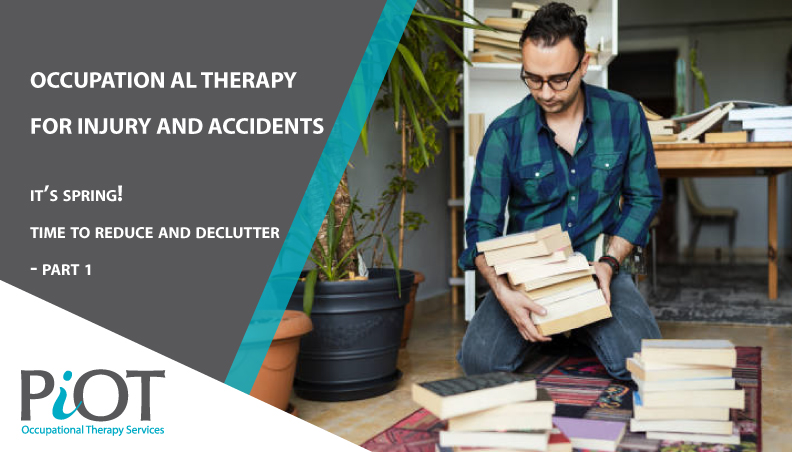
24 Mar SPRING FORWARD – TIME TO DECLUTTER (Part 1)
Not every person who lives with clutter is a hoarder. There can be many reasons that people have for hanging on to things that have long outlived their usefulness, enjoyment or purpose. There may no longer be a physical requirement for these items, yet they are difficult to part with. For some, there can be obstacles holding you back from organizing and purging your cluttered homes and workspaces. Perhaps you have sustained injuries that make the prospect of starting this task overwhelming. The commitment of an extended period of time for going through items can be difficult to anticipate due to pain and mental fatigue. If you are not clearing items on a regular basis, these items have a way of quickly collecting and filling up spaces. This can create physical problems such as tripping hazards or overflowing storage spaces, to the point of interfering with your activities of daily living. It can affect your mood and ability to concentrate as you experience self-doubt about your ability to take care of the problem because you just can’t seem to get started, and it is weighing on your mind. The task can seem overwhelming. It may affect your social life as the embarrassment of your overfilled home prevents you from having people over, for fear of them judging you. As we are slowly lifting the pandemic restrictions and moving into new routines, spring seems to be an ideal time to declutter our living spaces.
It can be difficult to imagine getting rid of things to which we have an emotional attachment. It may be collections that an older relative cherished and kept on display, that you associate with good memories from when you were younger. Now that you have inherited the collection, you feel obliged to hang on to it, even though you realize that it just does not have a place in your smaller, trendier home. Perhaps you are a parent who proudly hangs on to every painting and project that your children bring home from school, year after year. What we must realize is that it is the memory that matters most, not the memento. Whether or not you eliminate and organize some of the objects, the memories will still be intact. You are not betraying the memory of a loved one by keeping the amount of clutter in your home under control.
Guilty feelings can influence your decision to hang on to some things. Late Aunt Edna would be hurt if she knew you were getting rid of that gift she gave you way back when. Similarly, by passing on your collections to your children or other people, you are imposing your memories on to them and burdening them with taking ownership of these memories. While passing along these items may seem like a virtuous thing to do, it is rarely appreciated, as it perpetuates the original problem of clutter. Realize that these memories belong to you, not your children. Their recollections will be different and they may want to honour them differently, in a way that does not involve objects that you deem important.
In part 2, we will look at some useful strategies to declutter your spaces.

